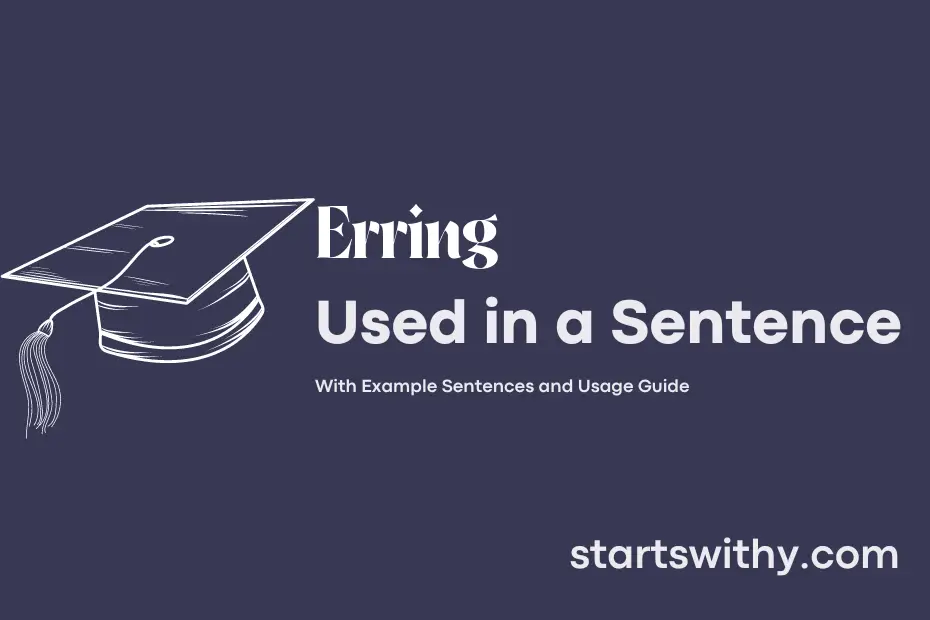Ever wondered how to use the word “erring” in a sentence? When you use the term “erring,” you are describing someone who is making a mistake or acting incorrectly in a particular situation. This word is often used to point out a fault or misjudgment made by an individual.
In English grammar, “erring” functions as a verb and can be used to highlight the act of being mistaken or making an error. Whether discussing someone’s misstep in judgment or behavior, incorporating “erring” into a sentence helps convey the idea of faulty actions or decisions.
7 Examples Of Erring Used In a Sentence For Kids
- Erring means making a mistake.
- We should try our best to avoid erring.
- It’s okay to make a mistake sometimes, as long as we learn from our erring.
- Erring is a part of learning and growing.
- Let’s be patient with ourselves when we are erring.
- Remember, everyone makes erring once in a while.
- We can always ask for help when we are erring.
14 Sentences with Erring Examples
- Erring in citing sources can lead to accusations of plagiarism.
- It is important to acknowledge and learn from erring on exams.
- Erring in judgment when choosing elective courses can result in a waste of time and money.
- Seeking help from professors can prevent you from erring in understanding complex topics.
- Erring in time management can lead to missing deadlines and underperforming in assignments.
- Evaluating and correcting erring study techniques can improve academic performance.
- Erring in group project communication can lead to misunderstandings and conflict.
- Asking for feedback from peers can help you identify erring patterns in your writing.
- Erring in attendance can result in missed opportunities to learn from discussions and lectures.
- Examining and addressing erring study habits can lead to better retention of information.
- Erring in submitting incomplete assignments can negatively impact your grades.
- Erring in formatting your citations can lead to marks deduction for lack of attention to detail.
- Admitting to erring in calculations during lab experiments can lead to a better understanding of the process.
- Adjusting your erring note-taking methods can help you retain information more effectively.
How To Use Erring in Sentences?
To use the word “Erring” in a sentence, you can follow these simple steps. First, identify a situation where someone has made a mistake or is in the wrong. Then, choose the word Erring to describe that person’s action or behavior. Next, construct a sentence using Erring as a verb to convey the idea of making an error. For example, “She was erring in her decision to skip class without informing her teacher.” This sentence shows how Erring can be used to communicate that someone has made a mistake.
It is important to note that Erring is often followed by a preposition like “in” or “on” to clarify what the mistake or error pertains to. For instance, “He was erring in his judgment of the situation.” In this sentence, the preposition “in” helps specify the context in which the error occurred.
By incorporating the word Erring into your sentences, you can effectively communicate the idea of making a mistake or being in the wrong. Practice using Erring in various contexts to become more comfortable with incorporating it into your writing.
Conclusion
In conclusion, the examples of sentences with “erring” illustrate instances where individuals have made mistakes, missed the mark, or deviated from the correct course of action. These sentences highlight the human tendency to err and the importance of learning from these missteps to improve and grow. By acknowledging and reflecting upon our errors, we can strive for better outcomes and avoid repeating similar mistakes in the future.
Overall, the diverse range of sentences with “erring” highlights the universal nature of human fallibility and the inherent value in recognizing and rectifying our errors. As we navigate through life, understanding that errors are inevitable but also opportunities for growth can lead to greater self-awareness, resilience, and success in our personal and professional endeavors.



